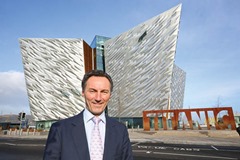Building a global brand
 Titanic Quarter CEO David Gavaghan discusses its progress and potential with Owen McQuade and calls for the region to build its brand in the growing Asian tourism markets.
Titanic Quarter CEO David Gavaghan discusses its progress and potential with Owen McQuade and calls for the region to build its brand in the growing Asian tourism markets.
Taking stock of Titanic Quarter in 2015, David Gavaghan is excited about the progress made to date and keen that Belfast – along with the region and island as a whole – capitalises on its position by using this well-recognised global brand.
“Almost three years since we opened Titanic Belfast, we now know that we have something which is a sustainable tourist attraction,” he comments. “It’s sustainable not only in the context of Belfast and not only in the context of Northern Ireland but indeed in the context of the island of Ireland.”
Gavaghan recently visited the Harry Potter studio tour outside London, which attracts 1.6 million visitors per year. Titanic Belfast is running at 700,000-800,000 annual visitors – an “incredible achievement” given the difference in population between the two regions.
“We also have six platforms in Titanic Quarter which, I think, are fundamental platforms for growth for the future,” Gavaghan adds. “Obviously, tourism is the first. The second – which has a nice serendipity in terms of Titanic – is the film industry with another global brand in Game of Thrones and we think there are huge opportunities to build on the filming platform and the creative media sector.”
Thirdly, he points to Norman Apsley’s work in developing the Northern Ireland Science Park and looks forward to more collaboration to expand its campus on both sides of Queen’s Road. The fourth platform is the opportunity for the education sector, building on the two universities’ links with the science park and Belfast Metropolitan College’s Titanic campus.
“Already, I think there are huge additional opportunities that we can extract out of the three institutions,” he comments, adding that ideally he would like to see a global institution “establish a foothold here in one of the best parts of the English-speaking world.”
Citi’s expansion forms the fifth platform and is “one of the most exciting stories” for people in Belfast. The firm, which arrived in Belfast in 2004, already employs 1,500 people and announced its intention in November to create another 600 planned jobs, thus filling up the Gateway offices.
“The senior directors pointed out that the average wage of the Citi employees is £35,000 per annum,” he explains, “which lifts the average wage across Belfast and across Northern Ireland and puts us in a really competitive position globally.”
The sixth, and last, platform centres on leisure-related activities. The Premier Inn has already opened and another three hotels are due to be constructed over the next three to five years.
“Belfast needs a lot more hotel beds,” he points out. As Chair of Visit Belfast, he is working with Belfast City Council and Tourism Northern Ireland to see how that can be delivered.
Titanic Quarter can be “a significant contributor to that endeavour” and he also wants to expand its population from the current level of 1,000 residents. Gavaghan elaborates: “As soon as we see the market really start to sustain itself, then we’ll be looking to build more residential units in 2016-2017 so that by 2020 we could potentially see up to 5,000 people living in Titanic Quarter.” However, this is predicated on the continued growth of Belfast’s population which only went up by 1 per cent between the last two censuses (2001-2011).
“We now need to be focused on how we can achieve significantly greater growth in this city and particularly in the heart of this city,” he remarks, adding that this must include Titanic Quarter.
Global brand
Discussing the city’s global brand, he notes that when Northern Irish businesspeople and officials visit China, their hosts may not initially know about Belfast but “you mention the word Titanic and immediately there’s a brand recognition.”
He therefore sees a real opportunity “to bring that brand recognition home and tell our story in a unique way.” Through Game of Thrones, he contends, Northern Ireland’s clean and green environment also stands out to potential Chinese visitors.
“The largest market for the Chinese traveller outside China is New Zealand and it’s shorter to travel from Beijing to Belfast than from Beijing to Auckland,” Gavaghan notes, “so we have an opportunity to reposition Belfast, Northern Ireland and the island of Ireland in those markets.”
He also namechecks Brazil, India and Indonesia as target tourist markets. Russia is also a potential market although it will face difficulties in the short-term as its economy is highly dependent on oil prices.
In conclusion, Gavaghan states: “I think we have a great opportunity to work with all the relevant bodies – in Northern Ireland, the Republic of Ireland and Great Britain – to bring a much greater awareness of what exists here in this great city and this wonderful region.”





